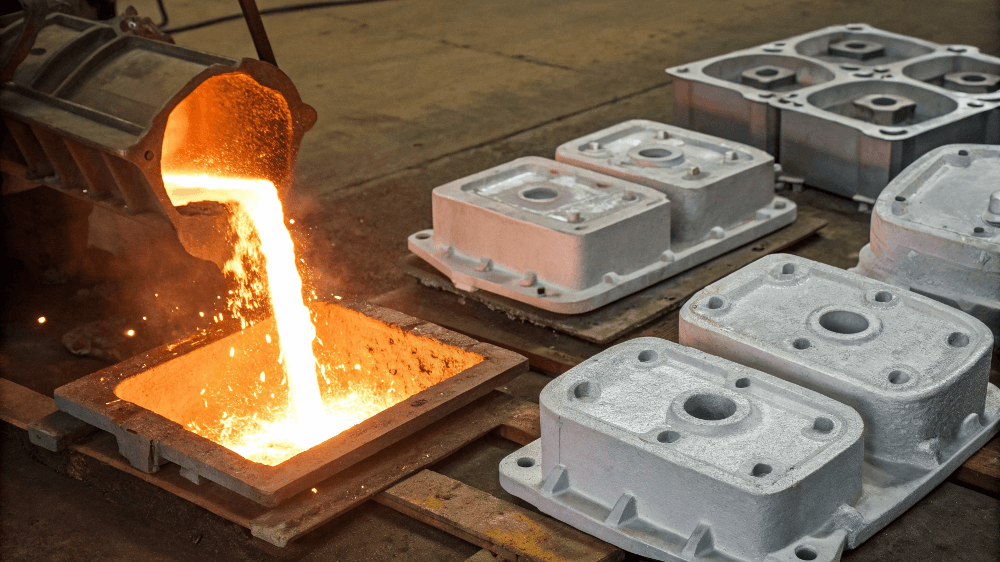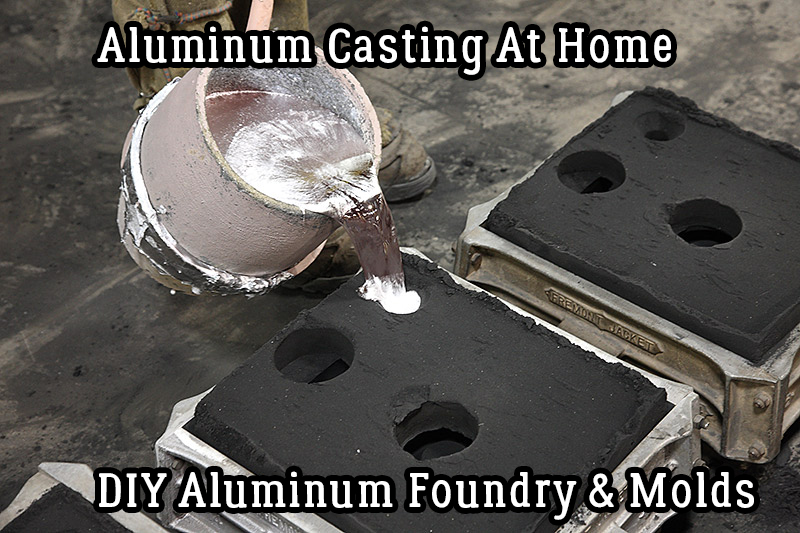Why Aluminum Foundry Wisconsin is preferred by many companies in casting
Comprehending the Advantages and Innovations in the Aluminum Foundry Market
The Aluminum Foundry market plays a crucial function in modern production. Its light-weight residential properties especially boost fuel effectiveness, specifically in aerospace and automotive industries. Furthermore, Aluminum's resistance to deterioration warranties long life in various applications. As the industry develops, developments such as advanced recycling and additive manufacturing are reshaping production methods. Exploring these improvements exposes not only the benefits but also the challenges in advance for Aluminum shops in a rapidly transforming market.
The Lightweight Benefit of Aluminum
Aluminum's light-weight nature provides considerable advantages across numerous industries, particularly in production and transport. Its reduced density permits the manufacturing of elements that are less complicated to set up and deal with, leading to reduced labor expenses and improved effectiveness. In the auto industry, lighter lorries add to enhanced gas economy and reduced exhausts, aligning with international sustainability objectives. In aerospace, the use of Aluminum lowers the general weight of aircraft, which is critical for improving efficiency and lowering operational expenses.
In addition, Aluminum's lightweight buildings assist in cutting-edge styles that were previously impractical with much heavier materials. This versatility enables manufacturers to produce complicated shapes and frameworks while maintaining architectural stability. Generally, the lightweight benefit of Aluminum not just improves product efficiency however additionally drives improvements in technology and style, making it a recommended product in numerous applications.
Corrosion Resistance and Toughness
The Aluminum Foundry market is renowned for generating materials with exceptional rust resistance, making them perfect for numerous applications. This home, incorporated with enhanced architectural stability, adds to the long-lasting efficiency benefits that Aluminum components provide. Therefore, markets significantly depend on Aluminum to fulfill requiring environmental problems without jeopardizing high quality.
Superior Corrosion Resistance
While various metals face significant difficulties from ecological aspects, Aluminum attracts attention for its superior rust resistance, making it a preferred option in numerous applications. This residential property is largely as a result of an all-natural oxide layer that bases on the Aluminum surface area, giving an obstacle against moisture and destructive agents. Unlike various other steels that might corrosion or deteriorate in time, Aluminum keeps its integrity also in severe atmospheres, such as commercial setups or coastal locations. In addition, its light-weight nature integrated with corrosion resistance makes it optimal for applications in aerospace, automobile, and marine sectors. Generally, Aluminum's exceptional longevity not only enhances product durability however likewise reduces upkeep expenses, providing an engaging advantage for manufacturers and consumers alike.
Enhanced Architectural Stability
Engineers and developers significantly acknowledge the importance of improved architectural honesty in contemporary applications, where both deterioration resistance and sturdiness are essential. Aluminum alloys, understood for their light-weight properties, likewise exhibit exceptional resistance to rust, making them ideal for harsh settings. The cutting-edge methods employed in the Aluminum Foundry sector contribute significantly to generating elements with improved toughness. Advanced casting procedures and alloy compositions are customized to meet particular efficiency needs, making sure that structures can endure severe problems without jeopardizing stability. Surface therapies and layers enhance the lifespan of Aluminum items, better mitigating deterioration over time. This concentrate on boosted architectural honesty not just extends the functionality of materials however likewise minimizes upkeep expenses, solidifying Aluminum's position as a product of choice in different sectors.
Resilient Efficiency Perks
Resilient performance in Aluminum components is mainly credited to their exceptional rust resistance and toughness. Unlike several steels, Aluminum naturally develops a protective oxide layer, which avoids rust and damage in various environments, consisting of industrial and marine setups. This intrinsic building considerably extends the life-span of Aluminum items, reducing maintenance and substitute expenses. Additionally, the light-weight nature of Aluminum boosts its applicability throughout industries without endangering stamina. The product's resistance to deterioration additionally contributes to its reliability in demanding applications, making it an ideal selection for automobile, aerospace, and construction sectors. As sectors increasingly focus on sustainability and longevity, Aluminum's efficiency advantages line up with modern design needs, strengthening its function in innovative production procedures.
Environmental Effect and Sustainability
 As the Aluminum Foundry market advances, it increasingly focuses on ecological impact and sustainability, acknowledging the requirement for responsible methods despite environment change. Initiatives to lessen waste and power consumption go to the center, with many foundries embracing reusing campaigns to reclaim Aluminum scrap. This not only reduces basic material use yet additionally especially reduces energy expenditure, as recycled Aluminum requires just a fraction of the energy compared to primary manufacturing.
As the Aluminum Foundry market advances, it increasingly focuses on ecological impact and sustainability, acknowledging the requirement for responsible methods despite environment change. Initiatives to lessen waste and power consumption go to the center, with many foundries embracing reusing campaigns to reclaim Aluminum scrap. This not only reduces basic material use yet additionally especially reduces energy expenditure, as recycled Aluminum requires just a fraction of the energy compared to primary manufacturing.Moreover, developments in discharges manage innovations are being executed to reduce air contaminants, straightening operations with stricter environmental policies. Foundries are additionally discovering alternative energy sources, such as solar and wind, to power their facilities sustainably. By fostering cooperation with stakeholders, the sector intends to establish innovative remedies that boost eco-friendly stewardship. Jointly, these initiatives highlight a dedication to reducing the Aluminum Foundry's carbon footprint while advertising a round economic climate within the manufacturing sector.
Advanced Production Techniques
 Transforming production procedures, the Aluminum Foundry sector is progressively integrating sophisticated manufacturing strategies to boost effectiveness and accuracy. Methods such as computer system numerical control (CNC) machining and additive production have become important parts in maximizing production operations. CNC machining enables high-precision component construction, significantly reducing product waste and manufacturing time. Additive manufacturing opens up brand-new methods for intricate geometries and light-weight designs that were formerly challenging to accomplish.
Transforming production procedures, the Aluminum Foundry sector is progressively integrating sophisticated manufacturing strategies to boost effectiveness and accuracy. Methods such as computer system numerical control (CNC) machining and additive production have become important parts in maximizing production operations. CNC machining enables high-precision component construction, significantly reducing product waste and manufacturing time. Additive manufacturing opens up brand-new methods for intricate geometries and light-weight designs that were formerly challenging to accomplish.In addition, the release of automation and robotics in Aluminum shops streamlines operations, lessens human mistake, and enhances employee safety and security. These technologies help with a more receptive manufacturing setting, enabling producers to adapt quickly to market demands. The assimilation of innovative simulation software application better enhances the style and screening phases, resulting in exceptional product high quality. Jointly, these strategies not just boost operational effectiveness however additionally foster innovation, placing the Aluminum Foundry sector at the center of modern-day production.
Innovations in Reusing Procedures
The Aluminum Foundry market is not just advancing in manufacturing strategies however is likewise making considerable strides in recycling procedures. Advancements are emerging to enhance the efficiency of reusing techniques, minimizing power intake and boosting sustainability. Advanced arranging innovations, such as computerized optical sorting, enable the identification his explanation and splitting up of Aluminum from various other products with high precision. This leads to a better of recycled Aluminum, which is important for maintaining the stability of the final items.
Closed-loop recycling systems are being executed, permitting producers to recycle Aluminum scrap within their own manufacturing processes. This lessens waste and promotes a round economic climate. In addition, research study right into new recycling strategies, such as hydrometallurgical processes, uses the potential for recuperating Aluminum from intricate waste streams. These advancements not only add to lowering the carbon footprint of the Aluminum Foundry sector but likewise strengthen its financial feasibility in an increasingly ecologically aware market.
Applications Throughout Different Industries
Countless industries are progressively acknowledging the convenience and benefits of Aluminum Foundry products, causing prevalent applications throughout industries such as vehicle, building and construction, consumer, and aerospace goods. In the auto market, Aluminum spreadings contribute to light-weight car styles, improving fuel performance and efficiency. Read Full Article Aerospace manufacturers utilize Aluminum components for their strength-to-weight ratio, necessary for airplane frameworks and parts.
In building and construction, Aluminum is favored for its toughness and resistance to deterioration, making it suitable for home window structures, roof, and architectural assistances. Durable goods also benefit from Aluminum Foundry products, as seen in cookware, electronic devices, and product packaging, where lightweight and recyclable materials are vital.
The adaptability of Aluminum Foundry techniques permits complex layouts and exact specs, satisfying the diverse needs of these industries. Consequently, Aluminum Foundry products are becoming indispensable to modern-day production processes throughout different markets.
Future Patterns in Aluminum Foundries
As industries remain to progress, Aluminum foundries are positioned to accept several vital patterns that guarantee to enhance performance and sustainability. One famous trend is the raising fostering of electronic innovations, consisting of automation and man-made intelligence, which simplify procedures and improve quality assurance. Additionally, the push in the direction of sustainable techniques is leading foundries to buy reusing technologies, substantially lowering waste and energy intake.
 Another emerging fad is using sophisticated alloys and products, accommodating the growing need for long lasting and light-weight components throughout numerous industries (Aluminum Foundry). Moreover, the assimilation of additive manufacturing methods is anticipated to transform component layout, offering personalization and lowering preparations
Another emerging fad is using sophisticated alloys and products, accommodating the growing need for long lasting and light-weight components throughout numerous industries (Aluminum Foundry). Moreover, the assimilation of additive manufacturing methods is anticipated to transform component layout, offering personalization and lowering preparationsCollaboration with research institutions is also expected to drive advancement, as factories look for to establish look at this site new processes and materials. Aluminum Foundry. Collectively, these patterns suggest a transformative future for the Aluminum Foundry market, aligning with more comprehensive objectives of sustainability and performance
Frequently Asked Inquiries
What Are the Regular Prices Related To Aluminum Foundry Manufacturing?
The regular prices linked with Aluminum Foundry manufacturing consist of basic materials, labor, power, devices maintenance, and overhead expenses. These factors collectively influence the overall economic investment needed for reliable Aluminum spreading procedures.
Exactly How Does Aluminum Compare to Various Other Steels in Toughness?
Aluminum, while lighter than lots of metals, exhibits impressive strength-to-weight ratios. Contrasted to steel, Aluminum is much less strong but supplies excellent deterioration resistance, making it a desirable option in applications where weight and toughness are necessary.
What Precaution Are in Area in Aluminum Foundries?
Security steps in Aluminum foundries typically consist of necessary personal safety devices, air flow systems to manage fumes, regular devices maintenance, training programs for employees, and adherence to stringent safety guidelines to reduce risks connected with molten steel handling.
Exactly How Is Quality Assurance Managed in Aluminum Casting Processes?
Quality assurance in Aluminum casting procedures involves strenuous assessments at various phases, consisting of raw material evaluation, procedure monitoring, and final product screening. Strategies such as statistical procedure control and non-destructive testing assurance adherence to sector requirements.
What Certifications Are Essential for Aluminum Foundry Suppliers?
The significance of accreditations for Aluminum Foundry distributors consists of ISO 9001 for quality administration, ISO 14001 for ecological management, and industry-specific requirements like ASTM and SAE, making certain compliance, security, and integrity in producing procedures.
The Aluminum Foundry sector plays a vital duty in contemporary manufacturing. The Aluminum Foundry sector is renowned for generating products with superior rust resistance, making them ideal for various applications. Reinventing manufacturing procedures, the Aluminum Foundry sector is increasingly integrating sophisticated manufacturing methods to boost performance and precision. The Aluminum Foundry market is not just progressing in producing methods but is also making substantial strides in recycling processes. As markets continue to develop, Aluminum shops are poised to welcome numerous vital fads that promise to improve efficiency and sustainability.